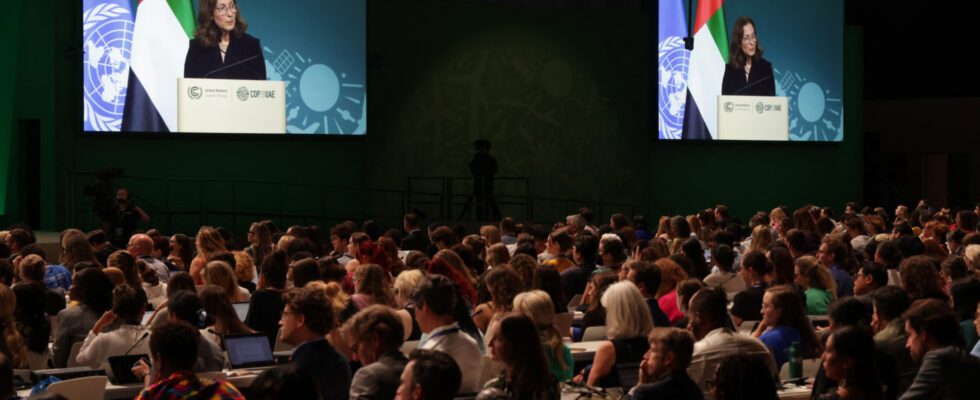On the defensive, the Emirati president of COP28 reaffirmed Monday that he respects climate science, which calls for a steep drop in greenhouse gas emissions, but the precise fate of fossil fuels to achieve this objective was still far from being decided. . “We are here because we believe and we respect science,” said Sultan Al Jaber in a press conference, to which he summoned Jim Skea, the president of the IPCC, the group of climate experts mandated by the UN .
Sultan Al Jaber was forced to clarify his position
The shady boss of COP28, implicated for months by environmental defenders for also being boss of the Emirati oil company Adnoc, embarked on this long exercise of self-justification before even the slightest question of a journalist. He subsequently once again took up the objective of reducing greenhouse gas emissions by 43% by 2030, compared to 2019, recommended by the scientific community to limit warming to +1 .5°C.
His comments responded to a controversy arising from a short sentence reported by the British daily The Guardian, resulting from an online exchange in November. “No scientific study, no scenario, says that the exit from fossil fuels will allow us to reach 1.5°C,” he then said in an informal exchange.
On Monday, Sultan Al Jaber was forced to clarify his position on this issue, at the heart of the discussions at COP28: “I have said again and again that the reduction and exit from fossil fuels is inevitable.” It therefore does not decide between the two options which are precisely the subject of long and detailed debates in the corridors and meeting rooms of COP28: “exit” or “reduction” of oil, gas and coal?
“Nothing other than a complete and rapid exit from energy will allow us to achieve” the 1.5°C objective and “this is the agreement that must be fostered for COP28 to be a success “, reacted Romain Ioulalen, from the NGO Oil Change International. The presidency of the COP, which is supposed to remain neutral, had caused trouble a little earlier by only mentioning the word “reduction”, in a summary of the debates of the first days of the conference published on Monday, where many leaders nevertheless called to put an end to the use of fossil fuels. It will actually be up to the approximately 200 nations represented in Dubai to decide.
Blockages
The two options appear for the moment in the first draft of the major text which the conference must produce between now and its theoretical outcome on December 12, in the form of a “global assessment” of the 2015 Paris Agreement. second version of this text, summarizing the often contradictory positions of the countries, is eagerly awaited by the tens of thousands of people present in Dubai.
The delegates hold meetings, but also “informal-informal” corridor discussions, in COP jargon. For the moment, everyone is sticking to their traditional positions, according to the participants interviewed by AFP. Island nations and several Latin American countries (Colombia, Peru, Chile, etc.), as well as the European Union, strongly defend aiming for the objective of 1.5°C rather than 2°C. And for this to get out of fossil fuels as quickly as possible, followed by the European Union.
Exit from fossil fuels
Other developed countries, producers of hydrocarbons (United States, Canada, Australia, Norway), are also in favor of this exit, but with less ambition from the current decade. Most African countries are also in favor of an exit from fossil fuels, but on condition of benefiting from a much longer period than already developed countries.
China and Russia opposed any mention of fossil fuels in the text. Just like Saudi Arabia, the world’s leading oil exporter, whose delegates are “pushing the use of carbon capture technologies in all angles of the negotiations”, says a European negotiator. But even if countries agree on an exit from fossil fuels, such a commitment will have little value without setting an ambitious timetable: “We cannot say ‘I will be sober by 2050, but I will drink my last glass in 2049′”, summarizes Alden Meyer, from the E3G think tank.
